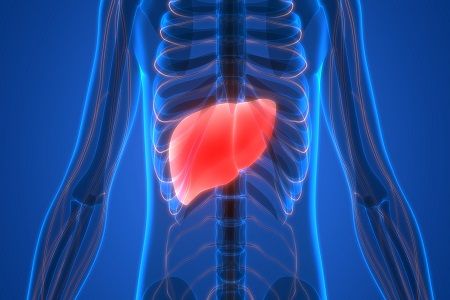Terlipressin Improves Survival Rates of Lower-MAP Patients with HRS-1
HRS-1 is a rare, acute complication of liver cirrhosis characterized by life-threatening and rapid progression that can end in renal failure. Terlipressin, a vasopressin analogue, could become the first therapy approved for the treatment of HRS-1 in the US.

Post-hoc analysis from a pair of completed phase 3 trials shows that terlipressin is associated with an improved overall and transplant-free survival in certain patients with Hepatorenal Syndrome Type 1 (HRS-1).
The new data, from the REVERSE and OT-0401 trials, was presented at the American Association for the Study of Liver Diseases (AASLD) annual meeting (Liver Meeting) in San Francisco, CA, this month. It indicates that HRS-1 patients with lower baseline mean arterial pressure (MAP) responded significantly to terlipressin in instances observed in the randomized, double-blind, placebo-controlled trials.
HRS-1 is a rare, acute complication of liver cirrhosis characterized by life-threatening and rapid progression that can end in renal failure. Terlipressin, a vasopressin analogue, could become the first therapy approved for the treatment of HRS-1 in the US—though its efficacy and safety have no yet been established by the US Food and Drug Administration (FDA).
Investigators pooled and analyzed 307 patients with HRS-1 for the post-hoc assessment. In both trials, patients received terlipressin or placebo plus albumin intravenously once every 6 hours for a maximum of 14 days. Investigators compared terlipressin and placebo in 2 variations of MAP rates: one with MAP <65 mm Hg, the other with MAP ≥65 mm Hg. Calculated with systolic and diastolic blood pressure rates, MAP ascertains whether patients are receiving enough blood flow, pressure, resistance, and supply to their major organs. A lower MAP level is generally more common in patients with decompensated cirrhosis and progressed liver disease.
Investigators assessed patients for overall and transplant-free survival, HRS reversal (serum creatinine [SCr] value of ≤1.5 mg/dl, and change in SCr from baseline.
Overall survival at 90 days was significantly greater among the patients with MAP <65 mm Hg treated with terlipressin (68%) versus placebo (24%; P < .005). However, no overall survival difference at 90 days was observed among patients with ≥65 mm Hg (P = .429).
In assessing for transplant-free survival at 90 days in patients with MAP <65 mm Hg, a significantly greater rate of patients receiving terlipressin (68%) again fared better than patients given placebo (28%; P = .015). And again, no difference in transplant-free survival between treatment groups was observed among patients with MAP ≥65 mm Hg was observed at 90 days (P =.291).
HRS reversal rates among patients receiving terlipressin were similar regardless of MAP levels, though just treated patients with MAP ≥65 mm Hg had a significantly higher rate of reversal than patients receiving placebo. SCr improvement from baseline was also significantly greater in patients treated with terlipressin than those with placebo in both MAP groups.
The findings indicating terlipressin’s benefit for HRS-1 patients with lower baseline MAP was reflected upon with excitement by Steven Romano, MD, chief scientific officer and executive vice president of Mallinckrodt—which sponsored the study. As Romano noted, patients with HRS-1 generally have an extremely poor prognosis and a life expectancy that could be limited to mere days.
“This pooled analysis of data from these two previously completed Phase 3 studies of more than 300 patients provides additional insights regarding the potential effect of terlipressin on key outcomes in patients with low baseline MAP,” Romano said. “We also continue to evaluate terlipressin in our ongoing phase 3 trial, the CONFIRM study."
The study, "Terlipressin Treatment Is Associated With Significantly Increased Survival in Patients With Hepatorenal Syndrome Type 1 (HRS-1) and Low Baseline Mean Arterial Pressure (MAP), Independent of HRS Reversal," was presented at the Liver Meeting last week.